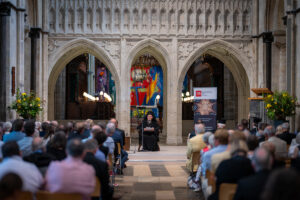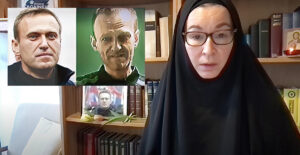Celebrating Christmas at the Phanar in a solemn atmosphere
In a solemn and joyful atmosphere, the Great Feast of the Nativity of Our Lord Jesus Christ was celebrated at the venerable Center of the Holy Great Church of Christ.
At the Divine Liturgy, which was held today, Wednesday, December 25, at the All-Holy Patriarchal Church, the Ecumenical Patriarch Bartholomew presided and the Hierarchs John, Geron of Pergamon, Meliton of Philadelphia, Chrysostomos of Myra, Stefanos of Kallioupolis and Madytos, Athenagoras of Kydonia, and Job of Telemessos concelebrated.
During the Divine Liturgy, His All-Holiness ordained as a priest the deacon Jacob Rindlisbacher, from Switzerland, and as deacon the subdeacon Andreas Webster, from Scotland, both brothers of the Holy Patriarchal and Stavropygial Monastery of St. John the Forerunner in Essex, England.
In his address, before the two ordinations, the Ecumenical Patriarch referred to the supranational nature of the Ecumenical Patriarchate, which is not closely related with nationalism. He recalled the words of Metropolitan John, Geron of Pergamon, who, in his address on the institution of the Ecumenical Patriarchate, had pointed out that “if this institution did not exist, it would have had to have been invented. Without the Ecumenical Patriarchate, Orthodoxy will fall into the vortex of nationalisms, into boasting about the past, into the introversion of self-sufficiency, into contempt for the modern world. The Ecumenical Patriarchate has shown that it can transform the past into the present, the present into the future, yesterday and today into tomorrow. This is because, in addition to its institutional capacity, it carries an open mindset, a universalism and a sensitivity to mankind of all ages. And that is the human guarantee of his future.”
Speaking to the deacon Jacob and the subdeacon Andreas, His All-Holiness emphasized the mission and importance of the ministry of the clergy in the modern world.
“The servant of the Most High does not belong to himself, but to Christ and the Church. The good clergyman is a soul and a body dedicated to his blessed work, always sacrificial, sensitive to human suffering, humble and simple, never sluggish or pessimistic. There is, as has been mentioned before, a ‘virtual priesthood’ that wants more to look than to be, to show rather than to offer. This tendency is today favored by the youth, the so-called ‘electronic order of things,’ which seems to shift the center of life from the tangible to virtual reality. Unfortunately, the charm of technology is altering the manner of our Christian witness, shrinking its personal dimension. Love is always a specific relationship with specific persons, it is a living coexistence, conversation, cooperation. It does not thrive as an abstract communication in cyberspace, as an exchange of emails and images. The ‘abstract’ and the ‘online’ puts a chill community and love. The deacon of Christ begs to be included in the ‘book of the Kingdom,’ to be recorded in the eternal memory of God and not to be recorded in the ‘documents of history,’ in the memory and ‘hard disk’ of the computer. The field of witness of the cleric is the church and not various ‘sites.’”
Then His All-Holiness addressed patriarchal admonitions and advice to the two candidates for ordination.
“I remind you, paternally, that it is a great privilege for us to belong to the holy clergy of the Holy Great Church of Christ, which, in all aspects of its spiritual work, owes much to the spirit of the Ecumenical Patriarchate, which is the heir and guardian of the tradition of the Apostles and Fathers. This unique tradition of truth is made up of the saints and martyrs of faith, our dogma and ecclesiastical ethos, our churches and sacred pilgrimages, the doxological and liturgical life, the zeal of the clergy, the ascetic struggles of monks and nuns, the life of the cross and resurrection of all who bear the name of Christ, the pastoral ministry and the proclamation of the Gospel, and the beautiful witness to ‘our hope’ in the world.
“You need to preserve the philanthropic spirit and the tradition of service of Orthodoxy, to serve Christ in the person of ‘the least of these my brethren’ (cf. Matthew 25:31-46). We recall here at this point the loving parable of the predecessor of Our Humility on the Throne of the Church of Constantinople, Gregory the Theologian: ‘Until the time has come, we visit Christ, we heal Christ, we nourish Christ, we clothe Christ, we are concerned about Christ, we honor Christ’” (On Philanthropy, ID’, m’, VEPES 59, 83).
“Our times require many things and sacrifices from the officers of the Church of Christ, given that unprecedented tendencies and developments, which frustrate the human person and place the ‘man-God’ in the position of ‘God-man,’ prevent the gospel message of Christianity from reaching the minds and hearts of our fellow human beings. Being aware of the impasses and problems of modern man and the positive prospects for his civilization, you are called to serve the people of God in full faithfulness to the tradition of the Church, in sincere love for man, in the upside-down prison of the signs of times. The ecclesiastical tradition will be for you a source of inspiration and spiritual enrichment. When you hear the sounding trumpets of the spirit, the crystalline voice of the Fathers, your spiritual senses will sharpen, you will echo the cry of anguish and the searching of the man of our time, whom you will support “commending yourselves as servants of God in all patience…by purity, knowledge, forbearance, kindness, the Holy Spirit, genuine love, truthful speech, and the power of God’ (II Cor. 6:4-7).”
Earlier, the General Secretary of the Holy and Venerable Synod, Archimandrite Joachim, read the Patriarchal Proclamation for the Feast of the Nativity of Christ.
The ecclesiastics Metropolitans Konstantinos, Geron of Nikaia and Amphilochios of Adrianopolis, Archons Offikion of the Holy Great Church of Christ, the Foreign Affairs Minister of Greece, Nikolaos Dendias, and his family, the Ambassador of Greece to Vietnam John Raptakis, Ambassador Eleni Vakalis, Deputy Head of the Embassy of Greece in Ankara, the Consul General of Greece in Istanbul, Georgia Sultanopoulou, the Consul General of Ukraine in Istanbul, Mr. Oleksandr Gaman, representatives of the Diaspora, teachers and students of the Zappeion and Zografeion School, members of the Ukrainian community of Istanbul, and many faithful from the city and abroad.
Present, among others, were the Vice President of the Jewish community of Istanbul, Mr. Moris Levi, a Representative of Religious and Minority Communities on the Board of Directors of the General Directorate of Vakoufia, based in Ankara.
Subsequently, His All-Holiness received at the Patriarchal Office the Minister of Foreign Affairs of Greece, Mr. N. Dendias, and his family, as well as the Mayor of the Metropolitan Municipality of the City, Mr. Ekrem Imamoglu, who came after the Divine Liturgy to express his warmest good wishes to the Ecumenical Patriarch and the Greek community on Christmas Day. There were also mayors and executives from various municipalities in the city.
This was followed by a private meeting of the Ecumenical Patriarch and Minister Dendias. Present were the Hierarchs John, Geron of Pergamon and Amphilochios of Adrianoupolis, the Archon Didaskalos of the Nation Konstantinos Delikostantis, Associate Professor of the University of Athens, as well as the Ambassador Eleni Vakalis, Deputy Head of the Embassy of Greece in Ankara, and the Consul General of Greece in the City, Georgia Sultanopoulou.
In the afternoon, the new Armenian Patriarch in Turkey, Sahak Maşalyan, accompanied by his entourage, visited the Phanar to give the Ecumenical Patriarch Bartholomew good wishes for the Feast of the Nativity of Christ.







